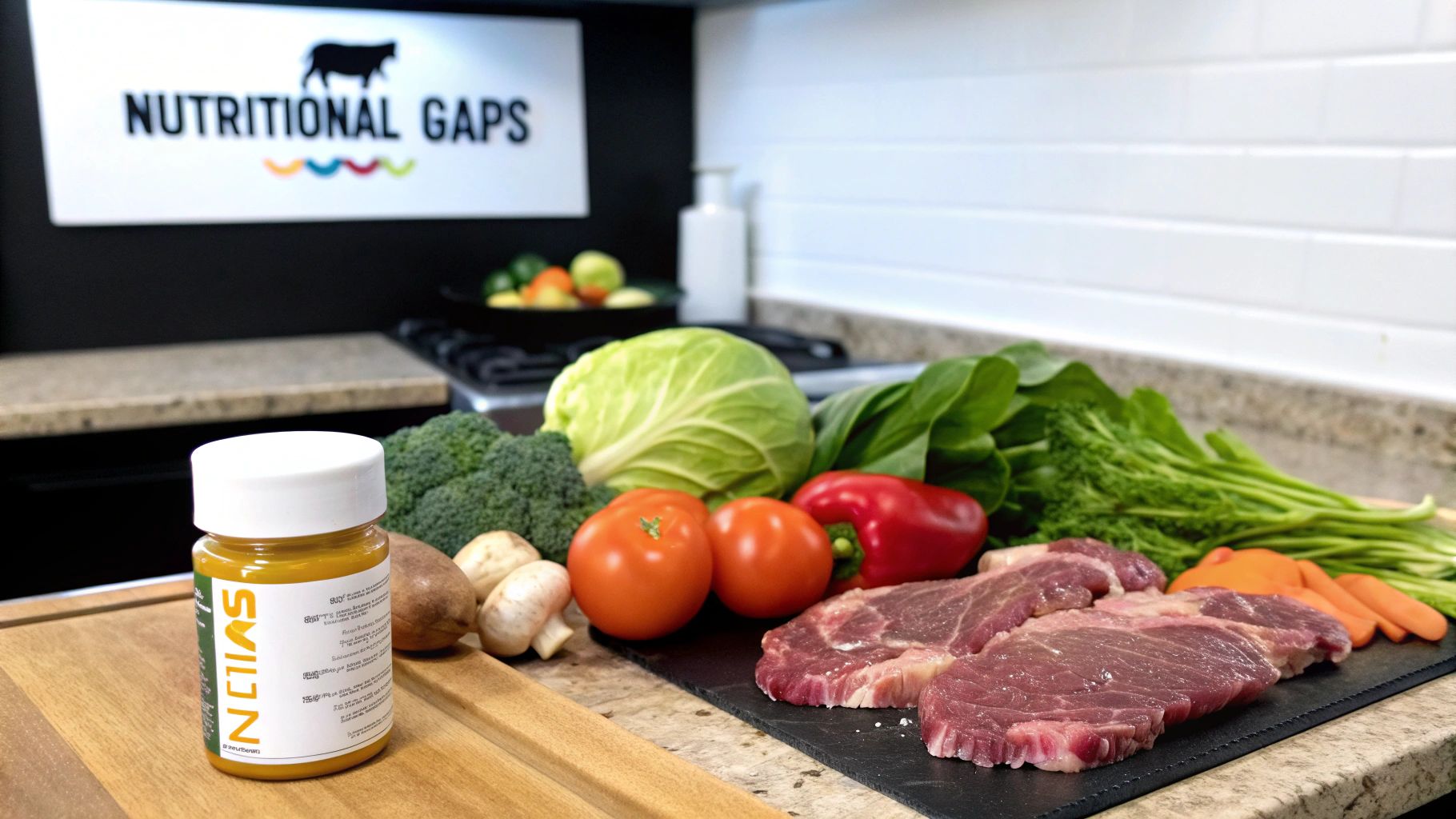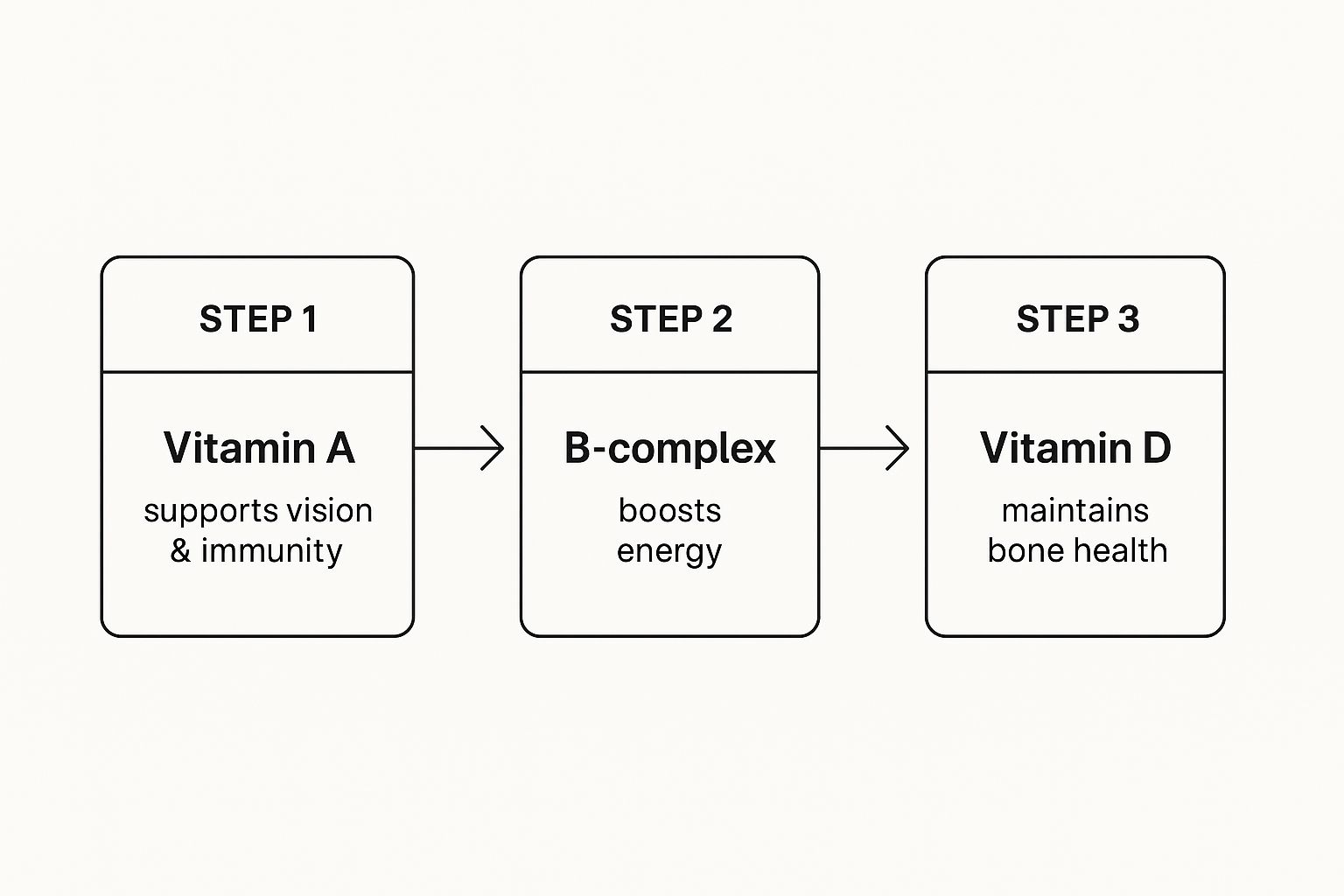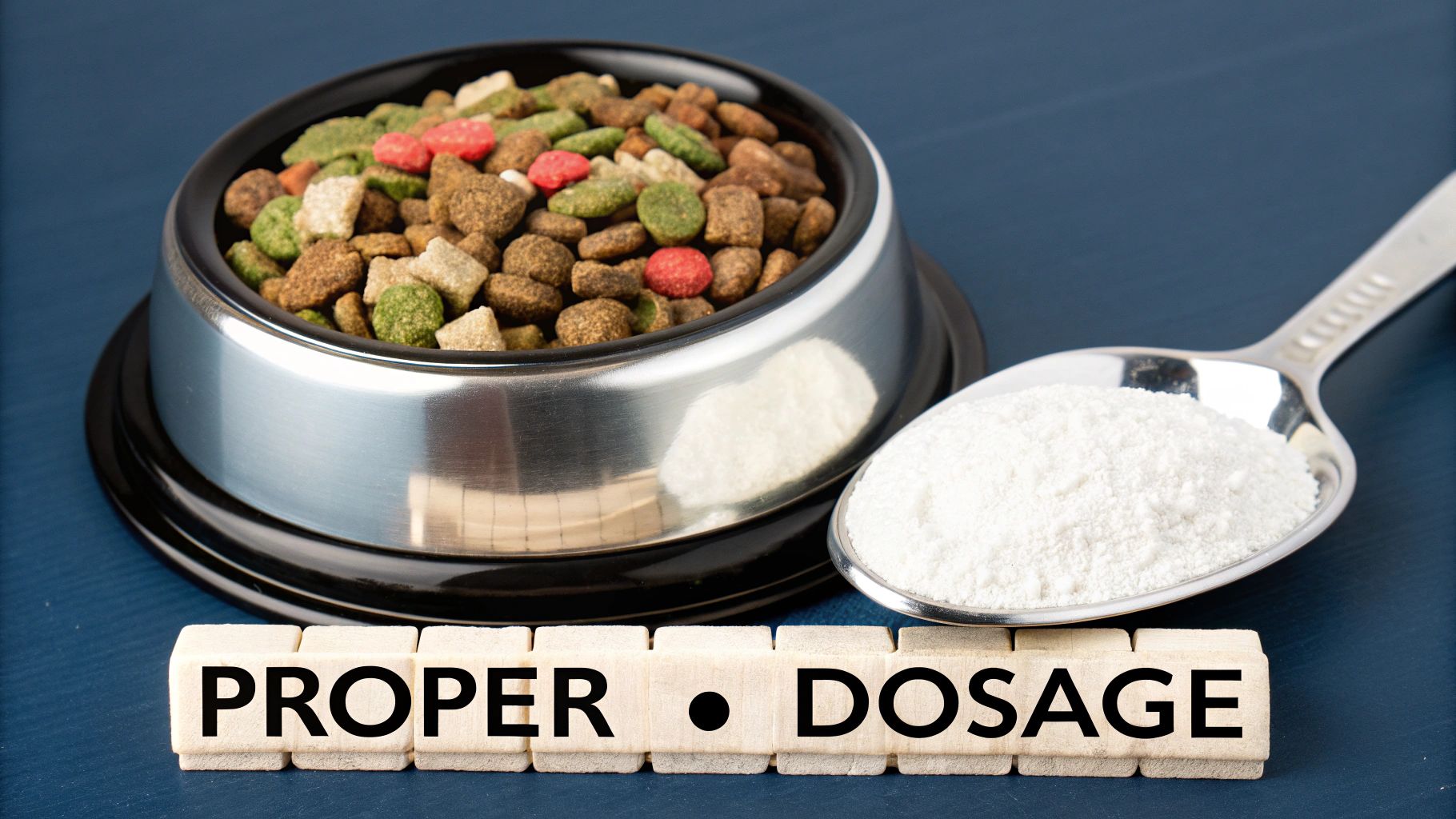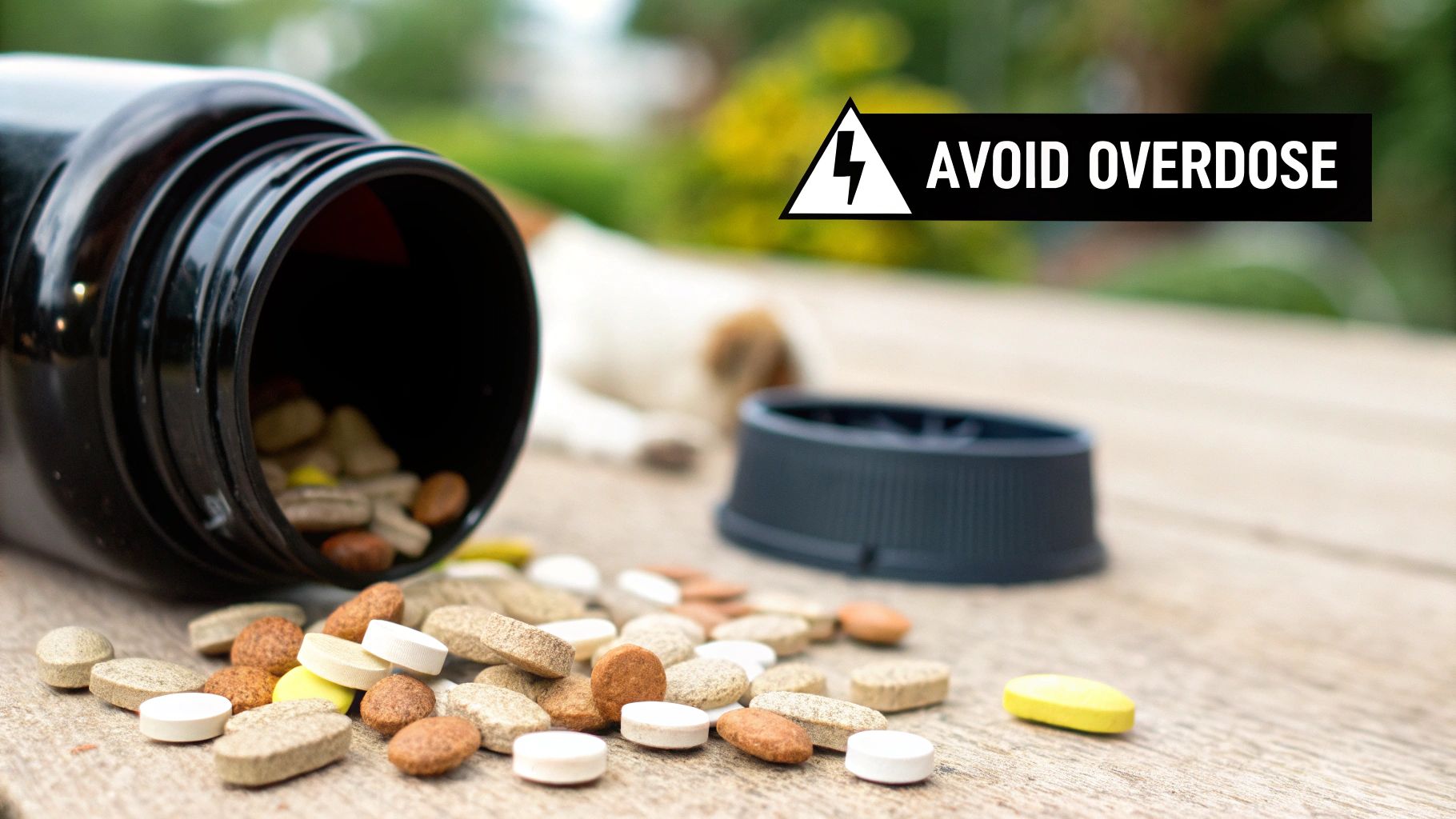
Homemade Dog Food Vitamins Guide
Deciding to make your dog's food from scratch is a wonderful commitment, but there's a crucial piece of the puzzle many people miss. Even with the best ingredients, your dog's bowl could be missing key nutrients. Adding the right homemade dog food vitamins isn't just a good idea—it's an absolutely essential step to protect your dog from nutritional deficiencies that can pop up in even the most carefully planned recipes.
If you skip this step, you might accidentally be feeding a diet that's less complete than the commercial kibble you wanted to leave behind.
Why Your Homemade Dog Food Needs Vitamins

Most of us start making homemade dog food to have total control over what goes into our pet's body. No more strange fillers or processed junk. It feels fantastic to serve up a fresh meal of lean turkey, vibrant carrots, and leafy greens. But that beautiful picture doesn't always tell the whole nutritional story.
A truly balanced diet for a dog is a complex science, requiring a precise harmony of vitamins, minerals, amino acids, and fatty acids. It's a common trap to think that just because a meal has variety, it must be complete. For dogs, whose nutritional needs are quite different from ours, a mix of high-quality meats and veggies often isn't enough to hit all the right notes.
The Problem with Unsupplemented Diets
I like to think of it like building a house. You can have the highest quality lumber, bricks, and drywall, but the structure is useless without the nails, mortar, and screws holding it all together. Vitamins and minerals are the "fasteners" for your dog's body, making sure every biological process runs smoothly.
When these tiny but mighty components are missing, serious health problems can develop over time. These issues don't always show up right away, but chronic deficiencies often reveal themselves through:
- Poor Skin and Coat Health: A dull, brittle coat or itchy, flaky skin is often one of the first red flags pointing to a lack of essential fatty acids or zinc.
- A Weaker Immune System: Not enough Vitamin E and other antioxidants can leave your dog vulnerable to every bug going around.
- Bone and Joint Issues: The calcium-to-phosphorus ratio is incredibly important for skeletal health. An imbalance, especially for a growing puppy or a senior dog, can lead to devastating problems down the road.
It's a sobering statistic: a study analyzing 200 homemade dog food recipes found online revealed that a shocking 95% were deficient in at least one essential nutrient. This really drives home how vital proper supplementation and expert guidance are.
How Cooking Changes Everything
Here's another wrinkle: the act of cooking itself. While cooking is great for making food digestible and killing off bacteria, it also destroys certain nutrients. Heat is the enemy of delicate vitamins, especially B vitamins and Vitamin C, which can be significantly depleted by boiling or baking.
So, even if your raw ingredients started out with enough of a particular vitamin, the finished meal you scoop into the bowl might not. This nutrient loss makes relying solely on food for complete nutrition a very risky game.
Filling the Gaps the Smart Way
This is exactly where a well-formulated vitamin and mineral supplement for homemade dog food comes in. These products are specifically designed to fill the nutritional holes commonly found in home-cooked meals. Using one takes the pressure off, removing the guesswork and providing a safety net that ensures your loving efforts create a truly healthy diet.
Choosing the right whole foods is a fantastic foundation, and it's worth learning about the best dog food ingredients to get started. But think of supplementation as the non-negotiable finishing touch that turns a good meal into a perfectly complete one. It’s the key to making sure the diet you provide is not just fresh, but also fundamentally balanced for your dog's long-term health and happiness.
Essential Vitamins and Minerals for Your Dog
Jumping into canine nutrition can feel a bit like learning a new language. You hear about Vitamin A, B-complex, zinc, and calcium, but what do they actually do for your dog? Getting a handle on the role of each nutrient is the first step from simply filling your dog's bowl to truly nourishing their body from the inside out.
Think of these vitamins and minerals as the microscopic building blocks of your dog's health. They work together in a complex biological symphony, keeping everything from their eyesight sharp to their immune system strong. When you're making food from scratch, you become the conductor of this nutritional orchestra.
The Powerhouse Vitamins Dogs Need
Vitamins are organic compounds that are absolutely vital for normal growth and all the metabolic processes happening inside your dog. We generally split them into two camps: fat-soluble and water-soluble.
Fat-soluble vitamins—like A, D, E, and K—are stored in the body's fatty tissues. On the other hand, water-soluble vitamins—like the B-complex group and Vitamin C—aren't stored, so your dog needs to get them in their diet much more frequently.
Here’s a quick rundown of the key players your dog relies on every single day:
- Vitamin A: A champion for vision, immune function, and healthy cell growth. It's especially important for growing puppies and maintaining great skin.
- B-Complex Vitamins: These are the energy drivers. Vitamins like Thiamine, Riboflavin, and B12 are crucial for converting food into fuel, supporting the nervous system, and forming red blood cells.
- Vitamin D: Often called the "sunshine vitamin," it's essential for managing calcium and phosphorus levels. This is non-negotiable for building and maintaining strong bones and teeth.
- Vitamin E: This is a powerful antioxidant that acts as a bodyguard for your dog’s cells, protecting them from damage and bolstering the immune system.
This infographic gives you a great visual on why some of these are so critical.

As you can see, each one has a specific, vital job. If there’s a deficiency in just one area, it can throw your dog's entire system out of whack.
Crucial Minerals for a Complete Diet
Minerals are every bit as important as vitamins. These inorganic elements are the foundation for everything from bone structure to nerve function and fluid balance. Without the right mineral mix, even the most lovingly prepared homemade meal will fall short.
Some of the most important minerals to get right are:
- Calcium and Phosphorus: These two are a team and need to be in a very specific ratio. They are the main components of bones and teeth, making them absolutely essential for skeletal health.
- Zinc: Think of this as the skin and coat superhero. Zinc also plays a huge part in immune response and proper thyroid function.
- Iron: This mineral is vital for producing hemoglobin, the protein in red blood cells that ferries oxygen from the lungs to the rest of the body.
A common pitfall is thinking a piece of meat and some veggies will naturally cover all the bases. But here's a real-world example: muscle meat is packed with phosphorus but has almost no calcium. If you feed an unsupplemented, meat-heavy diet for too long, you can unintentionally create a severe and dangerous mineral imbalance.
This growing awareness among pet owners is having a huge impact. The global pet supplements market, which includes homemade dog food vitamins, is on track to grow from about USD 2.82 billion in 2025 to an estimated USD 4.74 billion by 2034. That massive jump shows just how many of us are realizing that proper supplementation is key. You can discover more insights about the pet supplement market growth and what's driving it.
The table below gives a quick summary of these key nutrients and where you might find them.
A Snapshot of Key Nutrients for Dogs
| Nutrient | Primary Function | Common Homemade Food Sources |
|---|---|---|
| Vitamin A | Vision, immune health, cell growth | Liver, sweet potatoes, carrots, fish oil |
| B-Complex | Energy metabolism, nervous system | Organ meats, eggs, lean meat, leafy greens |
| Vitamin D | Calcium absorption, bone formation | Fatty fish (salmon, sardines), beef liver, egg yolks |
| Vitamin E | Antioxidant, cell protection | Spinach, seeds (use ground), plant oils |
| Calcium | Bone/teeth structure, muscle function | Ground eggshells, bone meal, dairy (in moderation) |
| Phosphorus | Bone health, energy transfer | Meat, fish, eggs |
| Zinc | Skin/coat health, immune function | Red meat, poultry, beans |
| Iron | Oxygen transport (hemoglobin) | Red meat, liver, spinach |
While whole foods are great, this table highlights why a balanced supplement is often necessary to fill the gaps and ensure proper ratios.
Finding Nutrients in Whole Foods
While a well-formulated supplement is the safest bet for achieving perfect balance, incorporating nutrient-rich whole foods is a fantastic way to boost your dog's meals. These foods add valuable nutrition, but they shouldn't be your only source for these essential vitamins and minerals.
Here are a few excellent whole-food sources to consider:
- Liver: This is a true superfood. It's an incredibly dense source of Vitamin A, iron, and a range of B vitamins.
- Fish Oil: Provides essential Omega-3 fatty acids (EPA and DHA) that support brain health, reduce inflammation, and give your dog a shiny, healthy coat.
- Sweet Potatoes and Carrots: Both are excellent sources of beta-carotene, which your dog's body cleverly converts into Vitamin A.
- Leafy Greens: A little bit of spinach or kale can offer up Vitamin K, iron, and a host of beneficial antioxidants.
But remember, this is a delicate balancing act. Too much of a good thing can be bad—for instance, excess Vitamin A can be toxic. And getting that calcium-to-phosphorus ratio wrong can lead to serious skeletal problems, especially in growing puppies. This is precisely why following a recipe from a board-certified veterinary nutritionist or using a meticulously balanced supplement is so critical for your dog's long-term health and safety.
How to Choose the Right Vitamin Supplement
https://www.youtube.com/embed/dt6i9IGQOIQ
Walking down the supplement aisle for your dog can feel just as overwhelming as navigating it for yourself. With so many bottles promising a world of health, how do you know what’s genuinely good and what’s just clever marketing? Picking the right vitamin supplement isn't just about tossing in some extra nutrients; it’s about strategically adding the right nutrients, in the right forms, to make your homemade meals truly complete.
Think of it this way: a good supplement is the final, crucial piece of the nutritional puzzle. It bridges any gaps that even the most carefully planned recipe might have. The wrong one, however, can be useless at best and potentially harmful at worst.
This push for better nutrition is a huge trend. The global market for natural pet food, which includes homemade diets like ours, is expected to grow from USD 15.28 billion in 2025 to a massive USD 23.05 billion by 2035. This isn't a fad; it's a movement of pet owners who, like you, want real, high-quality food for their dogs. You can see the full research on the natural pet food market for a deeper dive into this shift.
Decode the Label Like a Professional
The most powerful tool you have is the product label itself. It's where companies have to be honest, and learning to read it is your best defense against a bad purchase. Ignore the flashy graphics and cute dog photos—turn the bottle around and get to the facts.
The very first thing I look for is a nutritional adequacy statement. You want to see specific wording that says the product is formulated to meet the nutritional levels established by the AAFCO (Association of American Feed Control Officials) Dog Food Nutrient Profiles. This is your assurance that the supplement is actually designed to balance a diet according to industry-wide standards.
Pro Tip: If a supplement's label is silent on AAFCO or doesn't mention a board-certified veterinary nutritionist in its formulation, I see that as a major red flag. It's the bare minimum for commercial foods and should be non-negotiable for a supplement meant to complete a diet.
Understand Where the Nutrients Come From
Here’s something many people overlook: not all vitamins are created equal. The source of a nutrient has a huge impact on how well your dog’s body can actually absorb and use it. You'll mainly see two types.
- Synthetic Vitamins: These are produced chemically. They’re potent and cost-effective, but there's a debate about whether they are as bioavailable (easy for the body to use) as nutrients from whole foods.
- Whole-Food Vitamins: These come directly from concentrated food sources, like kelp for iodine or fish oil for Vitamin D. They also bring along other beneficial compounds that can help with absorption.
Honestly, the best supplements I've found often use a smart combination of both—synthetic forms for their stability and precise dosing, blended with whole-food sources for all their extra goodness.
The Critical Role of Third-Party Testing
A company can claim anything it wants on its packaging, but how do you verify it? This is where independent, third-party testing is so important. Good brands will voluntarily send their products to an outside lab to confirm two critical things:
- Purity: The lab checks for nasty contaminants like heavy metals, mold, or bacteria.
- Potency: This test confirms that the amount of each nutrient listed on the label is actually what's inside the bottle. You’re paying for 50 IU of Vitamin E, and this proves you got it.
Brands that invest in this level of quality control are proud of it. Look for a seal from the NASC (National Animal Supplement Council) or a mention of third-party lab testing on their website. Transparency like this is the mark of a company you can trust.
What to Actively Avoid on the Shelf
Knowing what to look for is only half the battle; you also need to know what to steer clear of. Keep an eye out for these warning signs.
- Vague or "Proprietary Blends": If you see a "special blend" listed without the specific amount of each ingredient, be suspicious. You have a right to know exactly what you're feeding your dog.
- Junk Fillers: Ingredients like corn, wheat, soy, artificial colors, and preservatives have no business in a quality vitamin supplement. They're just cheap fillers with zero nutritional benefit.
- Human Multivitamins: Never, ever give your dog a multivitamin made for people. They are balanced for our needs and can contain toxic levels of certain nutrients (like iron or Vitamin D) for a dog. Even worse, some contain xylitol, which is extremely poisonous to dogs.
Remember, a dog’s needs change as they age. For example, the best vitamins for senior dogs will often have added support for joints and brain health, which a puppy supplement won't. Always choose a product that's appropriate for your dog’s specific life stage.
Safely Adding Vitamins to Your Dog's Meals

So, you've done your homework and picked out a great vitamin supplement for your dog's homemade meals. Fantastic! But the job isn't quite done. The last piece of the puzzle is mixing that supplement into their food safely and correctly.
Getting this part right is what makes all your effort worthwhile. It ensures your dog gets all the nutritional benefits without any of the risks, like an upset stomach or, worse, over-supplementation.
Nailing the Correct Dosage
The golden rule here is simple but non-negotiable: always follow the package directions. It sounds almost too obvious, but this is where well-meaning pet owners often go wrong. When it comes to vitamins, more is definitely not better.
Dosage is almost always based on your dog's weight, so the first step is getting an accurate, recent number. Don't guess! A few pounds can make a real difference, especially for smaller dogs.
You should also consider your dog's lifestyle. A high-energy Border Collie who runs five miles a day has very different needs than a senior Pug who prefers to nap. If the supplement provides a dosage range, I always recommend starting at the lower end and checking with your vet to see if more is needed.
Over-supplementation is a real danger. This is especially true for fat-soluble vitamins like A and D, which can build up to toxic levels in the body. Sticking to the recommended dose isn't just a suggestion—it's a critical safety measure.
The demand for personalized pet nutrition is exploding. In fact, the U.S. dog food market is expected to reach USD 28.81 billion by 2033, driven by owners like us who want tailored options like homemade dog food vitamins. This trend is pushing brands to create more sophisticated products. You can learn more about U.S. dog food market trends to see just how much this space is growing.
Tips for Picky Eaters
What happens if your dog sniffs their newly fortified meal and walks away? It happens. Some supplements, particularly powders, can have a smell or taste that's new to your dog. The trick is to make it blend in seamlessly.
From my experience, these simple tricks work wonders for even the fussiest dogs:
- Mix it with something smelly (in a good way!): A spoonful of plain canned pumpkin, a little unsweetened yogurt, or some tasty wet food can easily mask the supplement.
- Add a little moisture: For powdered vitamins, try stirring in a splash of warm water or sodium-free broth. This helps the powder dissolve and coat every piece of kibble, so your dog can't just eat around it.
- Start tiny: For the first few days, add just a pinch—way less than the full dose. This lets your dog get used to the new smell and taste gradually before you work your way up.
This slow start isn't just about taste. It also gives your dog's digestive system time to adjust.
The Slow and Steady Introduction
Anytime you add something new to your dog's diet, "slow and steady" is the way to go. Rushing things is a common cause of digestive issues like diarrhea or gas, and nobody wants that.
A gradual introduction makes adding homemade dog food vitamins a positive experience. Our guide on how to transition a dog to new food lays out a great framework that works perfectly for supplements, too. The main idea is to start small and pay close attention to your dog.
For the first week, I suggest using just a quarter or half of the recommended daily amount. Keep an eye on their stool, appetite, and energy levels. If everything seems normal, you can slowly increase the amount over the next week until you reach the full dose. This careful approach is the best way to avoid tummy troubles and make the change a success.
Common Mistakes to Avoid with Canine Vitamins

It’s an amazing feeling to watch your dog gobble up a homemade meal you've just cooked. You put so much care into picking the best ingredients, but that final step—adding the vitamins—is where things can get tricky. Honestly, it's where even the most well-meaning dog owners can go wrong.
Navigating the world of homemade dog food vitamins is all about knowing what not to do. Getting this part right is what turns a good meal into a great one that truly nourishes your dog. Let's walk through a few common blunders I’ve seen over the years so you can steer clear of them.
The Myth of "More Is Better"
It's easy to fall into the "more is better" trap. A little extra vitamin powder for good measure, right? Wrong. In reality, over-supplementing can be just as dangerous as not supplementing at all. For some vitamins, it can even be toxic.
This is especially true for the fat-soluble vitamins: A, D, E, and K. Unlike water-soluble vitamins (like B and C), where any excess is usually just peed out, these guys get stored in your dog's fatty tissues and organs. Give too much over time, and they can build up to dangerous levels.
- Vitamin A Toxicity: This can cause some nasty issues like joint stiffness, dehydration, and even damage to internal organs.
- Vitamin D Toxicity: This one is even scarier. An overdose of Vitamin D can lead to kidney failure and can be fatal.
You might be surprised to learn that a study of online homemade dog food recipes found a staggering 95% were deficient in at least one key nutrient. This shows why supplements are crucial, but it's also a warning against overcompensating without knowing what you're doing. The goal is always balance, never excess.
Reaching for Human Multivitamins
I get it, it seems convenient. You have multivitamins in your own cabinet, so why not just use those? Please don't. This is a massive mistake that can have devastating consequences. Our nutritional needs are completely different from a dog’s, and human supplements are dosed for us, not them.
There are two huge risks here:
- Toxic Ingredients: Many human supplements, particularly the gummy kind, contain xylitol. This artificial sweetener is incredibly poisonous to dogs. It can cause a sudden, catastrophic drop in blood sugar, seizures, and liver failure.
- Incorrect Dosages: Even without xylitol, human vitamins often have levels of iron and Vitamin D that are way too high for dogs. This can lead directly to the toxicity problems we just talked about.
Just don’t do it. Always, always stick to a supplement specifically made for dogs.
Thinking a Varied Diet Is Enough
Another common belief is that if you just feed a wide variety of fresh, whole foods, you'll naturally cover all the nutritional bases. While variety is a fantastic starting point, it's nearly impossible to hit every single nutritional target through food alone. This approach almost always leads to serious deficiencies down the road.
Take the all-important calcium-to-phosphorus ratio. Muscle meat is packed with phosphorus but has almost no calcium. If you feed a diet heavy on meat without adding a dedicated calcium source (like eggshell powder, bone meal, or a supplement), you create a huge imbalance. Your dog's body will actually start pulling calcium from its own bones to compensate, leading to serious skeletal issues.
A truly balanced diet is a science. Relying on a varied menu without a solid vitamin and mineral foundation is a big gamble with your dog's health. The right homemade dog food vitamins are your nutritional insurance policy—they fill in the gaps that even the healthiest whole foods leave behind.
Got Questions About Dog Food Vitamins? We've Got Answers.
Stepping into the world of homemade dog food is exciting, but it's totally normal to have a few lingering questions about supplements. After all, you’re taking on a big responsibility. Getting clear answers is the best way to move forward with confidence and do right by your best friend.
Let's dive into some of the most common questions I hear from fellow dog owners about using homemade dog food vitamins.
Can I Just Give My Dog My Own Multivitamins?
I get this question a lot, and the answer is a firm and absolute no. Giving a dog a human multivitamin isn't just a bad idea—it can be downright dangerous. Our nutritional needs are vastly different from a dog's, so the vitamin and mineral ratios are all wrong, which can easily lead to a toxic overdose.
The biggest danger? Many human vitamins, especially the gummy or chewable kinds, contain xylitol. This artificial sweetener is incredibly toxic to dogs, causing a catastrophic drop in blood sugar, seizures, and even liver failure.
Even if a vitamin is xylitol-free, the high levels of fat-soluble vitamins (like A and D) can build up in a dog's system over time and cause serious health problems. Stick to supplements formulated specifically for dogs, always.
How Do I Know My Homemade Recipe Is Actually Balanced?
Truthfully, the only way to be 100% sure your homemade diet is perfectly complete and balanced is to work directly with a board-certified veterinary nutritionist. They have the expertise to analyze and formulate recipes down to the last microgram, but I know that's not a realistic step for everyone.
This is where a good supplement becomes your non-negotiable safety net.
Think of a well-formulated vitamin and mineral mix as your nutritional insurance policy. It's designed to fill the gaps that are almost impossible to avoid when you're cooking at home. While a vet nutritionist is the gold standard, a quality supplement is the next best thing for your peace of mind.
It takes the pressure off trying to be a perfect canine nutritionist in your own kitchen.
What Are the Telltale Signs of a Vitamin Deficiency?
Spotting a nutrient deficiency can be tricky because the signs are often subtle at first and can look like a lot of other health issues. It's not always obvious what you're dealing with.
However, here are a few red flags to keep an eye out for:
- Dull, Flaky Coat: One of the first things to go downhill is often skin and coat health. It's a very visible indicator that something's missing.
- Lethargy: Is your dog suddenly less interested in walks or playtime? A dip in energy can sometimes be linked to a B-vitamin deficiency.
- Getting Sick Often: If your dog seems to be catching every little bug, a weakened immune system could be to blame. Vitamins A and E are crucial for immune function.
- Bone or Joint Issues: Limping or stiffness can point to an imbalance in the calcium-to-phosphorus ratio, a notoriously difficult thing to get right in homemade diets.
If you see any of these signs, your first call should be to your veterinarian. They can run the right tests to figure out what's really going on instead of leaving you to guess which supplement might help.
At Joyfull, our mission is to make complete pet nutrition simple and trustworthy. Our scientifically reviewed formulas use clean, high-quality ingredients to help you craft a homemade diet you can feel good about. Discover how Joyfull can help you create a truly balanced homemade diet today.

